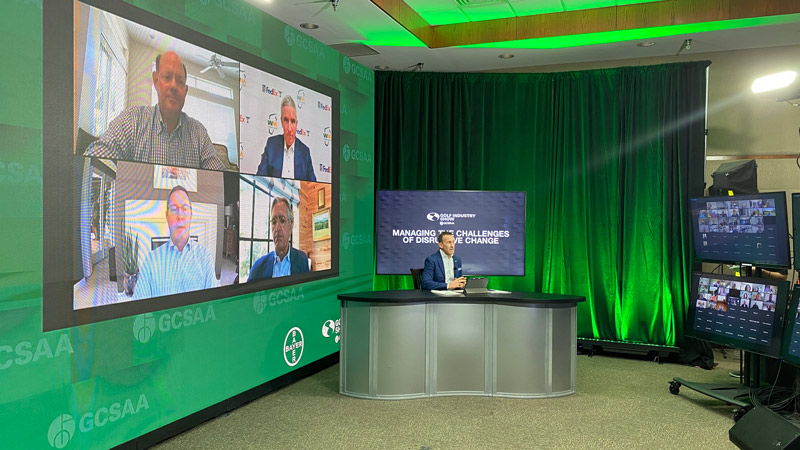
GCSAA CEO Rhett Evans (at desk) moderated a discussion among leaders in the golf industry on Wednesday, Feb. 3, during the 2021 virtual Golf Industry Show. Those on hand to talk about the state of the industry and its path forward were (clockwise from top left) Mike Davis, CEO of the USGA; Jay Monahan, PGA Tour commissioner; Seth Waugh, CEO of the PGA of America; and Michael Whan, LPGA Tour commissioner. Photo by Roger Billings
Pessimism often doesn’t serve those who ascend to the C-suite, so perhaps it should come as no surprise that when five of the top leaders of five of the top organizations in golf got together — virtually — on Wednesday, the overall atmosphere was one of cautious hope.
“I have never been more optimistic,” said GCSAA CEO Rhett Evans, a glass-half-full kind of guy if ever there were one. “I truly see a bright future for the game.”
Evans served as moderator for one of the 2021 virtual Golf Industry Show’s most anticipated sessions, “Managing the Challenges of Disruptive Change,” which brought together five of golf’s most capital of Cs: Evans and fellow CEOs Mike Davis (USGA) and Seth Waugh (PGA of America), plus Commissioners Jay Monahan (PGA Tour) and Michael Whan (LPGA). The panelists reflected on the maelstrom that was 2020 and also turned their attention to golf’s future and, importantly, its role in society at large.
And they somehow managed to squeeze all of that into a session that lasted just over an hour, thanks to a “Pardon the Interruption”-style countdown clock to which the speakers mostly adhered.
The cold, hard numbers provide evidence that the biggest of golf’s bigwigs’ glasses aren’t merely rose-colored when it comes to golf, be it the pastime, the sport or the industry as a whole. Despite worldwide interruptions and shutdowns early in 2020, golf bounced back in a big way.
Professional golf — at least the top tours — was among the first pro sports to resume in some semi-recognizable fashion, and recreational golf had an even more dramatic resurrection. Though pandemic precautions caused a drop of about 20 million rounds played in the spring of 2020, by year’s end, the net was plus-60 million rounds, a 14% gain year-over-year from 2019.
Editor’s note: Nine-hole golf courses in particular saw a boost from golf’s increased popularity during the coronavirus pandemic. Here’s a look at those numbers.
There was a net gain of 500,000 on-course golfers — the biggest increase in 17 years — and facility health was similarly on the rise. There were 31% fewer course closures than in the previous year, and, according to the National Golf Foundation, fewer than 8% of the nation’s 14,000-plus facilities report they are in poor financial shape. In 2016, that number was 25%.
So the numbers are good — better than anyone could have forecast nine or 10 months ago. Now what?
“I would say, keep doing what we’re doing,” Monahan said, giving a tip of the tam to the collaboration between all of golf’s prime forces to respond in a nimble, unified way. “The fact of the matter is, there’s tremendous momentum.”
“Life and golf and everything is a team sport,” echoed the PGA of America’s Waugh. “We talk a lot among this group and in slightly bigger groups about, ‘How do you rally yourself around a theme?’ If we cooperate and act as fiduciaries for the game, it’s going to work. We all took a simple approach: How do we get everybody to the other side of this thing? We had to keep everybody safe and restore and realize (golf) is a respite from all of this. Golf can be a part of the solution, not the problem. ... A big part of that is, more importantly, you’ve got to be human. Think about the person first. Be the best partner you can be to everybody. As a result, you can come out with a stronger culture, a stronger brand ... stronger in all sorts of ways.”

Photo by Javier Allegue Barros/Unsplash
Though no industry is without its faults, golf managed to unite to navigate the roiling, uncharted waters better than most, from getting its courses back open as soon and as safely as possible to getting its players — at all levels — back on them. In droves.
“If we were in tennis, it would be chaos right now,” Waugh said. “Fortunately, we’re in this industry. ... We were able to pull things off that, frankly, you wouldn’t be able to do in other businesses.”
Editor’s note: GCM has strived to document the golf industry’s response to the coronavirus pandemic, telling stories of innovation, adaptation, perseverance and giving back.
While all the speakers spent time waxing poetic about the game, they did take time to speak to its less meritorious side. Reflecting on 2020 would be difficult without acknowledging the issues of racial and societal injustice that came to the fore, and none of Wednesday’s speakers shied away from addressing those.
- Monahan: “We stand by anybody that’s been marginalized and underserved and underrepresented,” he said, noting the PGA Tour has prioritized diversity, equity and inclusion, especially since 2015. He said last summer’s “social reckoning” steeled his — and his organization’s — resolve. “We’re going to have third parties measuring our success.”
- The LPGA’s Whan: “I tell people all the time that organizational change doesn’t start until personal change does. For me, the summer of 2020 was a good personal-change moment. I believe you listen first, you learn, then you act,” he said, noting women make up far more of the LPGA workforce than the industry standard. “That, to me, was checking the box of diversity. ... (But) I wasn’t thinking about changing the color of the face of golf.”
- The USGA’s Davis: “I do think it starts with listening and looking internally, looking at your staff. You look at your board, look at your volunteers. Are they representative of the population? Holistically, as the game of golf ... how do we make golf more welcoming? It’s about listening. We don’t have all the answers. But if we’re willing to have some really hard conversations, we’ll all get there.”
- Waugh: “What worries me most is that I won’t have enough time to make much of a difference,” said Waugh, who openly acknowledged the PGA’s “Caucasian-only clause,” which was only removed in 1961, and his organization’s “woefully underrepresented” Black membership. “We’re 200 years in the making. There’s a great history in this game, but on this front, not so much. We all have to be incredibly intentional. This is a huge opportunity for individuals and the country to change all that. … If we can make the game look more like the world, maybe the world can behave more like the game we love so much.”
All four acknowledged lip service isn’t the answer. Whan shared an anecdote for which the implication was obvious.
“My father used to say to me,” Whan recalled, “‘I appreciate your optimism, but I’ll evaluate your results.’”
Though that evaluation is yet to come, there was solidarity around Waugh’s earnest belief that golf can be a significant doer of good.
“There is no better engine for good than this game,” Waugh said, “in terms of charity giving and lessons learned. ... For me, this is the biggest opportunity I’ll ever have to impact the greatest number of lives. I think it’s a worthy thing, a legacy for all of us. ... Did you leave the room better than you found it?”
Andrew Hartsock is GCM’s managing editor.